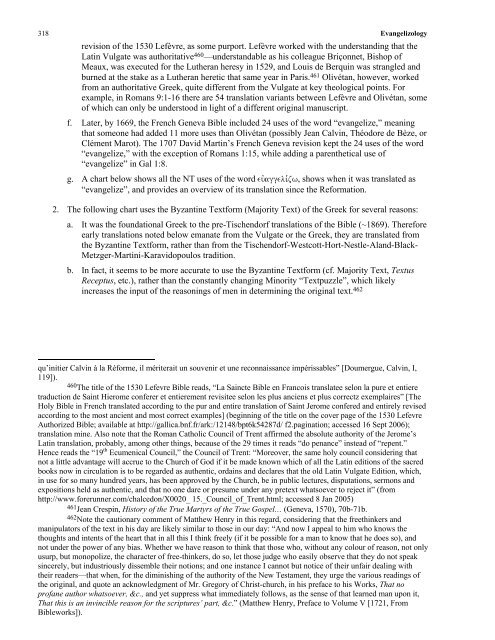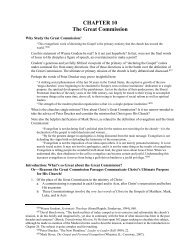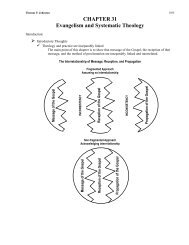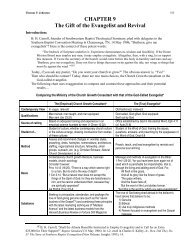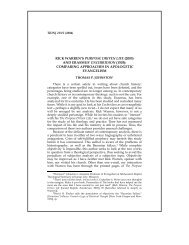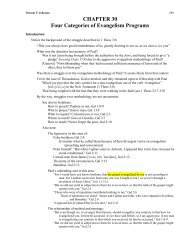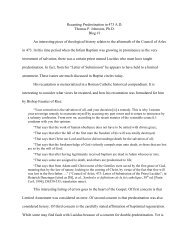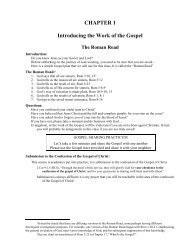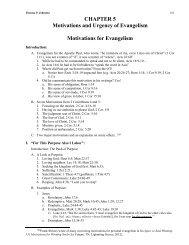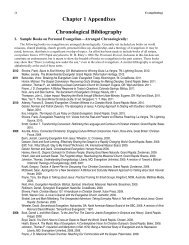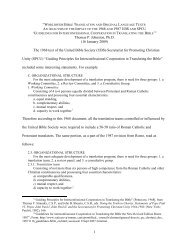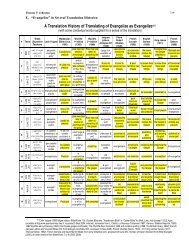CHAPTER 7 Defining Evangelizing - Evangelism Unlimited
CHAPTER 7 Defining Evangelizing - Evangelism Unlimited
CHAPTER 7 Defining Evangelizing - Evangelism Unlimited
Create successful ePaper yourself
Turn your PDF publications into a flip-book with our unique Google optimized e-Paper software.
318 Evangelizology<br />
revision of the 1530 Lefèvre, as some purport. Lefèvre worked with the understanding that the<br />
Latin Vulgate was authoritative460 —understandable as his colleague Briçonnet, Bishop of<br />
Meaux, was executed for the Lutheran heresy in 1529, and Louis de Berquin was strangled and<br />
burned at the stake as a Lutheran heretic that same year in Paris. 461 Olivétan, however, worked<br />
from an authoritative Greek, quite different from the Vulgate at key theological points. For<br />
example, in Romans 9:1-16 there are 54 translation variants between Lefèvre and Olivétan, some<br />
of which can only be understood in light of a different original manuscript.<br />
f. Later, by 1669, the French Geneva Bible included 24 uses of the word “evangelize,” meaning<br />
that someone had added 11 more uses than Olivétan (possibly Jean Calvin, Théodore de Bèze, or<br />
Clément Marot). The 1707 David Martin’s French Geneva revision kept the 24 uses of the word<br />
“evangelize,” with the exception of Romans 1:15, while adding a parenthetical use of<br />
“evangelize” in Gal 1:8.<br />
g. A chart below shows all the NT uses of the word euvaggeli,zw, shows when it was translated as<br />
“evangelize”, and provides an overview of its translation since the Reformation.<br />
2. The following chart uses the Byzantine Textform (Majority Text) of the Greek for several reasons:<br />
a. It was the foundational Greek to the pre-Tischendorf translations of the Bible (~1869). Therefore<br />
early translations noted below emanate from the Vulgate or the Greek, they are translated from<br />
the Byzantine Textform, rather than from the Tischendorf-Westcott-Hort-Nestle-Aland-Black-<br />
Metzger-Martini-Karavidopoulos tradition.<br />
b. In fact, it seems to be more accurate to use the Byzantine Textform (cf. Majority Text, Textus<br />
Receptus, etc.), rather than the constantly changing Minority “Textpuzzle”, which likely<br />
increases the input of the reasonings of men in determining the original text. 462<br />
qu’initier Calvin à la Réforme, il mériterait un souvenir et une reconnaissance impérissables” [Doumergue, Calvin, I,<br />
119]).<br />
460 The title of the 1530 Lefevre Bible reads, “La Saincte Bible en Francois translatee selon la pure et entiere<br />
traduction de Saint Hierome conferer et entierement revisitee selon les plus anciens et plus correctz exemplaires” [The<br />
Holy Bible in French translated according to the pur and entire translation of Saint Jerome confered and entirely revised<br />
according to the most ancient and most correct examples] (beginning of the title on the cover page of the 1530 Lefevre<br />
Authorized Bible; available at http://gallica.bnf.fr/ark:/12148/bpt6k54287d/ f2.pagination; accessed 16 Sept 2006);<br />
translation mine. Also note that the Roman Catholic Council of Trent affirmed the absolute authority of the Jerome’s<br />
Latin translation, probably, among other things, because of the 29 times it reads “do penance” instead of “repent.”<br />
Hence reads the “19 th Ecumenical Council,” the Council of Trent: “Moreover, the same holy council considering that<br />
not a little advantage will accrue to the Church of God if it be made known which of all the Latin editions of the sacred<br />
books now in circulation is to be regarded as authentic, ordains and declares that the old Latin Vulgate Edition, which,<br />
in use for so many hundred years, has been approved by the Church, be in public lectures, disputations, sermons and<br />
expositions held as authentic, and that no one dare or presume under any pretext whatsoever to reject it” (from<br />
http://www.forerunner.com/chalcedon/X0020_ 15._Council_of_Trent.html; accessed 8 Jan 2005)<br />
461 Jean Crespin, History of the True Martyrs of the True Gospel… (Geneva, 1570), 70b-71b.<br />
462 Note the cautionary comment of Matthew Henry in this regard, considering that the freethinkers and<br />
manipulators of the text in his day are likely similar to those in our day: “And now I appeal to him who knows the<br />
thoughts and intents of the heart that in all this I think freely (if it be possible for a man to know that he does so), and<br />
not under the power of any bias. Whether we have reason to think that those who, without any colour of reason, not only<br />
usurp, but monopolize, the character of free-thinkers, do so, let those judge who easily observe that they do not speak<br />
sincerely, but industriously dissemble their notions; and one instance I cannot but notice of their unfair dealing with<br />
their readers—that when, for the diminishing of the authority of the New Testament, they urge the various readings of<br />
the original, and quote an acknowledgment of Mr. Gregory of Christ-church, in his preface to his Works, That no<br />
profane author whatsoever, &c., and yet suppress what immediately follows, as the sense of that learned man upon it,<br />
That this is an invincible reason for the scriptures’ part, &c.” (Matthew Henry, Preface to Volume V [1721, From<br />
Bibleworks]).


